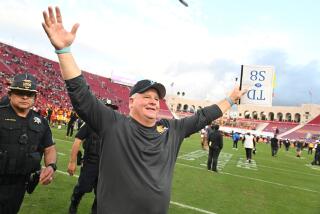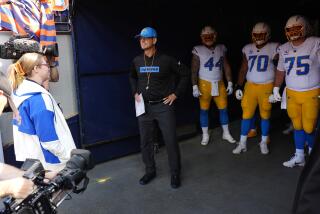Assistant Coaches No Longer Relegated to the NFL Sidelines
- Share via
Not that many years ago, they worked in virtual anonymity. They drew up their schemes and designed their game plans, and then they carried them out on Sundays. If their plan worked, the head coach got the credit. If it didn’t work, the head coach got the blame, too.
Their salaries were low, their profiles lower. Their star was so tied to that of their bosses that they typically arrived on the day he was hired and departed the day he was fired.
These days, life is different for an offensive or a defensive coordinator in the National Football League.
Miami Dolphins Coach Jimmy Johnson, for example, leaves almost all of the drawing of X’s and O’s to others.
“The main reason I do it this way is the psychological aspect of it,” Johnson said. “By being able to delegate responsibility, the coaches feel they have a bigger stake in the decisions and it allows them to become better coaches. You’re more productive when you have that feeling.”
Thanks to talk radio, increased media attention and an increasingly complex game, the coordinators have become almost as talked about, scrutinized and criticized as the head coach. Nowadays, some of them make $300,000 a season, which is more money than most head coaches made until a few years ago.
For that kind of money, the stakes have changed. More than half the NFL teams had new defensive coordinators last season. Next season, there will be even more turnover because of 11 head coaching changes and numerous shifts inside teams that retained their head coaches.
If an offensive or defensive coordinator does well, he’s almost guaranteed a head coaching job. Washington’s Norv Turner, Carolina’s Dom Capers and San Diego’s Kevin Gilbride are among the head coaches who got their opportunities after doing brilliant work at the coordinator level.
There’s also a flip side: criticism once shouldered almost exclusively by the head coach is now shared--or in some cases borne entirely--by the coordinator.
When the Dallas Cowboys struggled last season, it was offensive coordinator Ernie Zampese--and not head coach Barry Switzer or running back Emmitt Smith--who was torched on talk radio. In Washington, defensive coordinator Ron Lynn was criticized, then fired, for the season’s second-half collapse.
No other NFL team gives a coordinator as much power as the Cowboys do, but in several other places, they are very prominent.
For instance, Carolina Coach Dom Capers organized his staff into four entities: head coach, offense, defense and special teams. By leaving much of the detail work to others, Capers is free to set an overall tone and handle disciplinary problems.
However, unlike Switzer, who at times seems barely involved in the day-to-day details, Capers has a hand in everything.
“I’m on the headset during games communicating with the coordinators, but I want them to know I have total confidence in them,” Capers said. “If I feel strongly about something, I’ll make a suggestion, but they make the calls. One thing I believe strongly is that if you get over-involved in one area, it’s hard to oversee everything. I think the team senses if you’re over-involved in one area. I want them to know that I can stand up and talk about what we’re going to do defensively, offensively and the kicking game. That’s part of my weekly procedure. To me, the greatest challenge as a coach is keeping everyone together.”
Capers is a stickler for details, and it’s those details he believes a head coach should handle. He keeps meticulous notes and spends part of each day emphasizing and re-emphasizing what he believes will be that week’s challenge.
When he rebuilt the Cowboys, Johnson allowed his coordinators almost total control of their individual game plans, while he acquired the talent and oversaw the entire team.
Johnson sits in on a variety of meetings and works at building relationships with important players--such as quarterbacks Troy Aikman in Dallas and Dan Marino in Miami. He also makes sure practices are run at the right speed and the right tempo. He develops goals early in the week and reminds players of those goals as game time nears.
More to Read
Go beyond the scoreboard
Get the latest on L.A.'s teams in the daily Sports Report newsletter.
You may occasionally receive promotional content from the Los Angeles Times.










